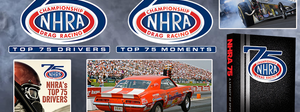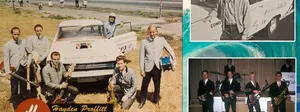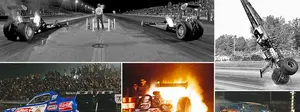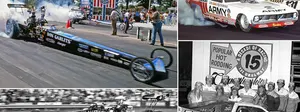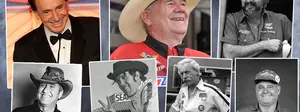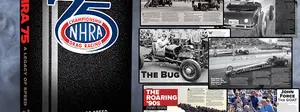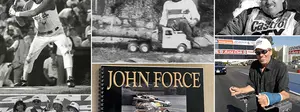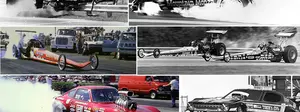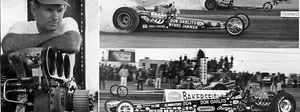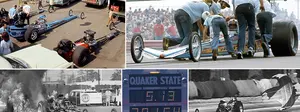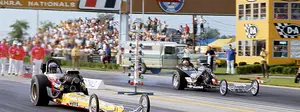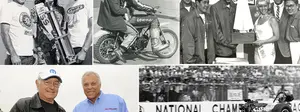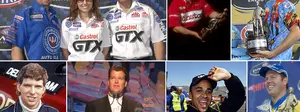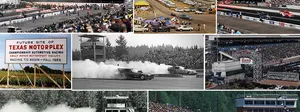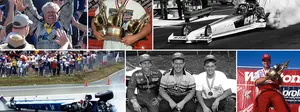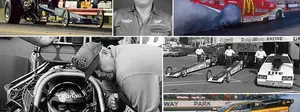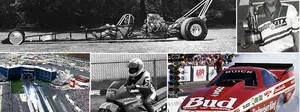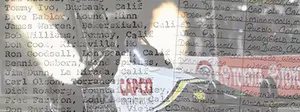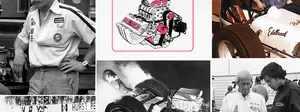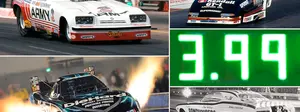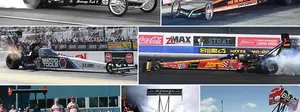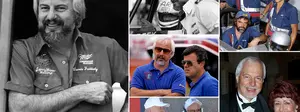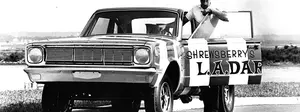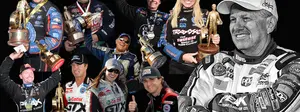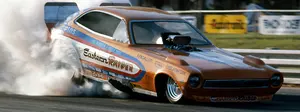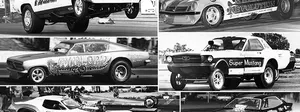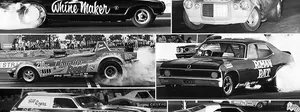Ed McCulloch: Roaring down Memory Lane
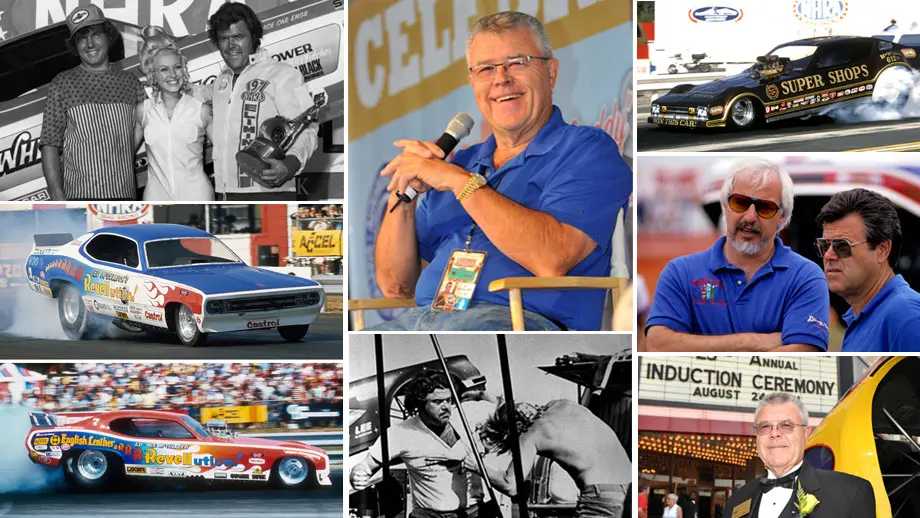
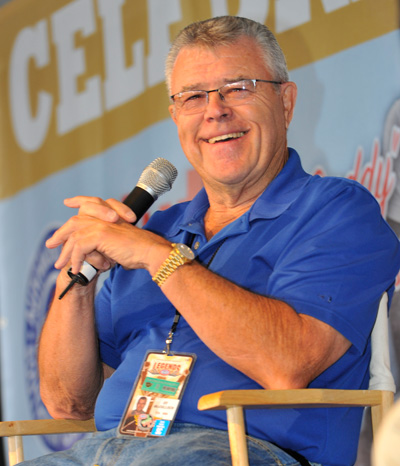 As usually happens when I get all Fanboy talking to my heroes, my chat last week with Ed McCulloch about his Indy successes took some far-from-topic turns. I’d ask a question, he’d give me some backstory and before you knew it we're off on some sideroad. He’d start apologizing for getting off course, but there I was, egging him on, my foot planted atop his on the accelerator down the road to Memory Lane.
As usually happens when I get all Fanboy talking to my heroes, my chat last week with Ed McCulloch about his Indy successes took some far-from-topic turns. I’d ask a question, he’d give me some backstory and before you knew it we're off on some sideroad. He’d start apologizing for getting off course, but there I was, egging him on, my foot planted atop his on the accelerator down the road to Memory Lane.
Once I pulled out what I needed for the Indy piece, I was left with all kinds of interesting and funny snippets that I‘ve assembled into a column for today. I used this tactic before in National Dragster following a lengthy interview with Don Prudhomme – too much good stuff that I didn’t want to leave on the cutting-room floor – that I called “Snake’s Take” and that I thought would work here. (I also dug out that old Prudhomme piece, which I’ll share next week.)
Enjoy.
Going solo, and making it work
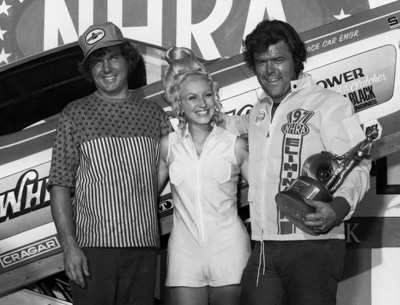 After getting his start in Top Fuel, McCulloch went Funny Car racing with Art Whipple in 1969, and they brought Ed Wills (of Mr. Ed fame) into the picture late in 1971. Whipple and McCulloch stayed together until early in the 1972 season, splitting after their victory at the season-opening Winternationals.
After getting his start in Top Fuel, McCulloch went Funny Car racing with Art Whipple in 1969, and they brought Ed Wills (of Mr. Ed fame) into the picture late in 1971. Whipple and McCulloch stayed together until early in the 1972 season, splitting after their victory at the season-opening Winternationals.
McCulloch: “Art and I had hooked up with Ed and went to Pomona and won. Art had begun dating Candy, Ed’s oldest daughter, and on Monday or Tuesday after the race, Art told me that he was going to stay there with Ed and build a car with him. We came to an agreement and parted ways as friends and have remained friends to this day.
“The general consensus, though, was that this was the end of Ed McCulloch because they didn’t think I could run the car on my own. I had always been involved in the mechanical end of the car. A lot of people didn’t realize that. I knew the combination, I knew the clutch, and understood it all. So it was just me and brother [Dan] who headed out to Gainesville, and we won there. Then we won in Columbus. That was very satisfying. I’d be lying if I didn’t admit that it was gratifying to call Art and tell him that we’d won.”
Down and dirty
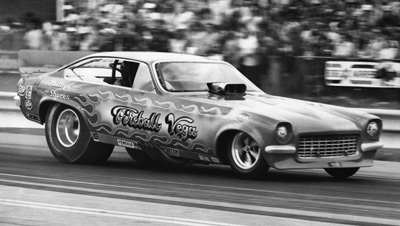 McCulloch met a lot of great racers along the road, including Paul Smith, whose Fireball-branded floppers were a force in the early 1970s, and who continues to race today with son John.
McCulloch met a lot of great racers along the road, including Paul Smith, whose Fireball-branded floppers were a force in the early 1970s, and who continues to race today with son John.
McCulloch: "I think the world of Paul Smith. He can get a car down the racetrack, but my first encounter with him was in Hollywood, Fla. It was the first time we’d ever been down there. We’re in line ready to race and I look over at his car and it’s absolutely a mess. It’s filthy dirty; just terrible. Smith comes up and he’s talking to me, and I ask him, ‘Do you have to get a tetanus shot before you get in that thing?’ Paul will tell you the same story, but he’ll add that he went out and kicked my ass … and he probably did."
The Revell deal
 In early 1972, McCulloch was one of the first to fly the colors of model maker Revell, who went on to make models of more than a dozen other top cars. Here’s the story of how that deal came to be.
In early 1972, McCulloch was one of the first to fly the colors of model maker Revell, who went on to make models of more than a dozen other top cars. Here’s the story of how that deal came to be.
McCulloch: “We used to do a lot of tire testing for Firestone. Jim Cook was the PR guy for Parnelli Jones and Mario Andretti and all those Indycar guys. I used to beat on him all the time because Firestone would pay all these other guys personal services contracts but we never got anything. It was one excuse after another. Finally, they put Jim in charge of finding us sponsorship. He went out and put together two deals for us, with Revell and Castrol. It was actually on the side of the car at the [Supernationals] in Ontario in 1971. We were the first guys to get money; I think only us and [Gene] Snow got money from them; maybe 'Jungle Jim' [Liberman]. Pretty much everyone else just got royalties off the model sales.”
Talking about a R-R-R-R-R-Revellution
That first Revell-sponsored Duster was called Revellution -- Revell picked the name -- and it was a name that was branded on “the Ace’s” cars through the end of the 1977 season and remains synonymous with his career.
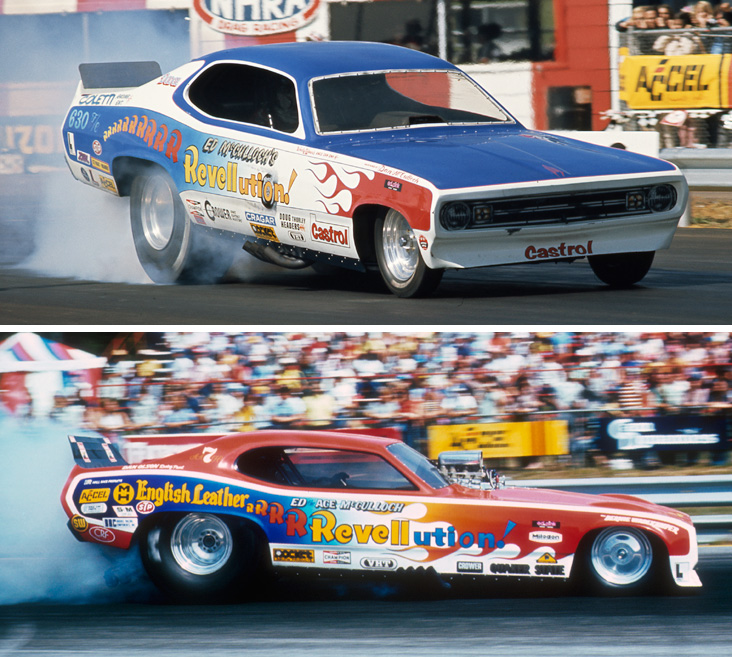
McCulloch: “The original design had 14 Rs in Revellution, but people might not have noticed was that as time went on, it looks like every painter deleted an R. I don’t know what it ended up with, but it got less every year.
"A lot of people also probably didn’t notice this but on the left side of the original car, the R’s started on the front fender towards the back, with flames on the left-rear quarterpanel. On the other side of the car, it was reversed -- the R’s started on the right-rear quarterpanel and ran forward, and the flames were on the right front fender.
"Revell pulled out after 1977. We had a great run and I respect them and the way they handled it. They explained to me that what they did was changing courses and that automotive models were going by the wayside."
Hired gun, Part 1
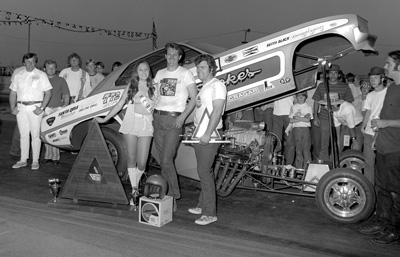 McCulloch’s 1972 season started with three straight national event wins (Pomona, Gainesville, and Columbus), but also included a victory at the prestigious March Meet, though winner's circle photos might indicate otherwise. McCulloch was driving for Jim Murphy in the 1971 Indy-winning Barracuda that McCulloch had sold him, which had rebranded with Murphy's Holy Smokes name.
McCulloch’s 1972 season started with three straight national event wins (Pomona, Gainesville, and Columbus), but also included a victory at the prestigious March Meet, though winner's circle photos might indicate otherwise. McCulloch was driving for Jim Murphy in the 1971 Indy-winning Barracuda that McCulloch had sold him, which had rebranded with Murphy's Holy Smokes name.
McCulloch: “Jim had never driven a Funny Car, so I told him what he needed to do and how to set it up. He goes to Bakersfield and makes a few attempts but can’t get it down the track. He called me up and asked me to come there and drive it. It was all my stuff so I was familiar with it. I took the clutch apart and found what he had screwed up, then went out and won the race.”
Hired gun, Part 2
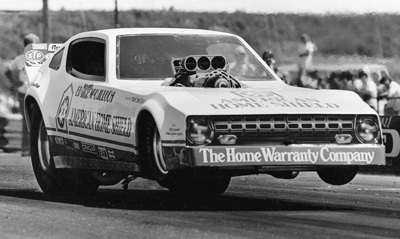 After the Revell deal ended the previous season, McCulloch raced a new Plymouth Arrow in 1978 with the backing of home-warranty company American Shield, then sold that Arrow to racecar painter Bill Carter, for whom he drove a few races (including the Winternationals) before sliding into the Super Shops Arrow in 1980. The car, which previously had been driven by Dave Hough and Pat Foster -- the big gimmick being a sweepstakes where a fan could actually win the car at season's end -- was run by "the Old Master," Ed Pink.
After the Revell deal ended the previous season, McCulloch raced a new Plymouth Arrow in 1978 with the backing of home-warranty company American Shield, then sold that Arrow to racecar painter Bill Carter, for whom he drove a few races (including the Winternationals) before sliding into the Super Shops Arrow in 1980. The car, which previously had been driven by Dave Hough and Pat Foster -- the big gimmick being a sweepstakes where a fan could actually win the car at season's end -- was run by "the Old Master," Ed Pink.
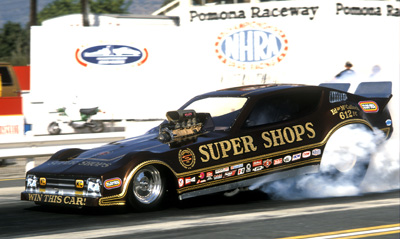 McCulloch: “After 1978, I had to make the decision whether to hock or mortgage everything -– my home, my shop –- and get enough money to run for another year and try to get a sponsor to continue on, but if I didn’t I would be broke and owe a lot of people, so I decided I didn’t want to do that.
McCulloch: “After 1978, I had to make the decision whether to hock or mortgage everything -– my home, my shop –- and get enough money to run for another year and try to get a sponsor to continue on, but if I didn’t I would be broke and owe a lot of people, so I decided I didn’t want to do that.
“In 1980, Pink called me and offered me the ride in the Super Shops car that Pat Foster had been driving, but that only lasted a year. That was my first real go as a hired driver, flying into the race and then flying out instead of being with the crew, and I didn’t get much of a say-so in the tuning. Truthfully, I didn’t like that a whole lot.”
Hired gun, Part 3
After the Super Shops deal ended, McCulloch was mostly on the sidelines for three seasons (1981-83), though he drove Jerry Verheul’s second car at a few Northwest match races. It was a low point in his career and life.
McCulloch: “Those were some pretty tough times. I’d gotten into the reinforced steel business, but the construction business was slow and I had to close that company down. Things were so bad for us that I was driving a truck for Art Whipple. I owe a lot to [late wife] Linda. She stuck with me through thick and thin and was always supportive. Then I got the call from Larry Minor asking me if I’d like to drive his new Funny Car.
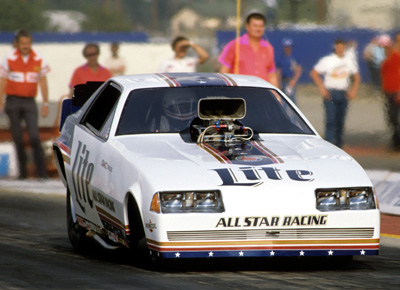 “I had checked out the Minor-Gary Beck Top Fuel operation and it was first class, so we went down to Hemet [Calif.] to meet with him. He told me he’d give me a salary and a percentage. He threw a number at me and I about fell out of my chair. I was stunned at how little he was offering me.
“I had checked out the Minor-Gary Beck Top Fuel operation and it was first class, so we went down to Hemet [Calif.] to meet with him. He told me he’d give me a salary and a percentage. He threw a number at me and I about fell out of my chair. I was stunned at how little he was offering me.
“I told Linda I didn’t know if this was a good idea, that I could make more money driving trucks. She reminded me that it might be my last kick at the cat, and that if I wanted to try it, we could tighten our [financial] belts and try it. It wasn’t until I was talking to Gary later that I found out that I also got a percentage of his car’s winnings, and he had a championship-contending car. That really changed the picture.
“Every year, when it came time to renew my contract, it seemed like Larry always wanted to give me a pay cut or a percentage cut. In 1988, he decided he couldn’t pay me a salary, but would give me a 50-percent cut of the winnings. He said I could run match races, IHRA, whatever, between NHRA events. We won the IHRA championship that year, won the $100,000 bonus at Billy Meyer’s [IHRA] race, and won the U.S. Nationals again. At the end of the year, I made more money than I’d ever made in my life.”
A real handful
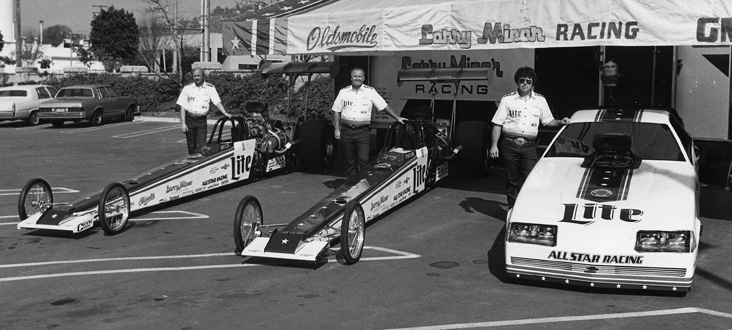
In addition to the Miller Lite dragster of Gary Beck and “Ace’s” Olds Firenza flopper, team owner Larry Minor also had his personal Top Fuel car, which ran on occasional, stretching the team’s resources.
McCulloch: “People never realized it but we ran three cars – my car, Gary’s car, and Larry’s hobby car – but there were only five fulltime employees to run three cars: Me, Gary, Willie [Wolter], Bernie [Fedderly], and Darren Capps. Larry would fly in some other guys, but come Sunday night it was all on us. I remember one year in Montreal, we had blown up a lot of [parts]. I mean, our pit area looked like a war zone. Larry loads up everyone and leaves us standing there, looking at each other. We weren’t sure we could even load it up in one day.”
Terrifying tangle
At the 1984 Cajun Nationals, McCulloch’s Olds got loose early in the run, crossed the centerline, and collided with John Collins’ JVC Camaro in one of the most spectacular wrecks ever seen. Neither driver was injured, but McCulloch clearly still carries some emotional scars.
McCulloch: “It was a terrible deal. That track was a mess, and that year there was water coming up through the track. The car left, then made a right-hand turn. I’ve watched the video over and over. You can see me correcting but the car just kept on going and I t-boned him. I remember being upside-down and sliding on top of the guardrail. It was a bad deal. As a driver who prided himself on being in control of his car, it was a terrible feeling. I was crushed. Larry ended up buying John a new car.”
Five Aces
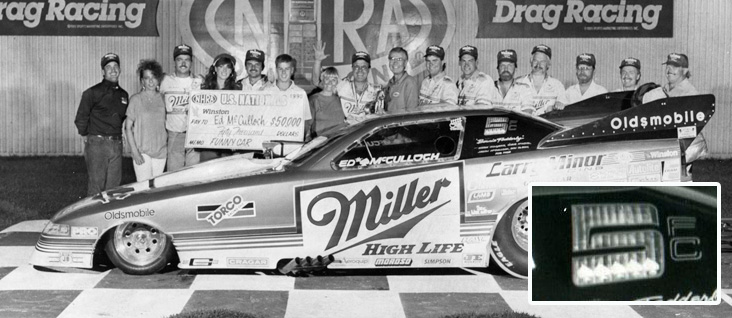
Standing in the winner’s circle after winning Funny Car at Indy for the fifth time in 1990, the fading sunlight revealed a hidden gem as McCulloch noticed, for the first time, under the ideal lighting conditions, that painter John Pugh had hidden five aces in “the Ace’s” competition number – also a five for his 1989 points finish.
McCulloch: “The reflection of the sun brought them out. I had never seen them until the winner’s circle. I'm not sure it he was predicting anything there, but it was my fifth Indy win. How amazing was that?”
The Cruz Connection
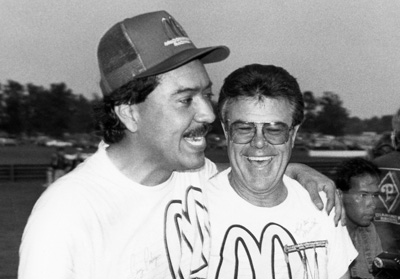 Don Prudhomme and Kenny Bernstein left Funny Car at the end of the 1989 season to return to their Top Fuel roots. Two years later, McCulloch joined them, switching rides with new Minor driver Cruz Pedregon.
Don Prudhomme and Kenny Bernstein left Funny Car at the end of the 1989 season to return to their Top Fuel roots. Two years later, McCulloch joined them, switching rides with new Minor driver Cruz Pedregon.
McCulloch: “The guys who I had raced all my life, guys like ‘Snake’ and Bernstein, were running Top Fuel cars and I wanted to race those guys again. Larry agreed, and he put Cruz in the McDonald’s Funny Car and me in the dragster. If I hadn’t done that, who knows –- Cruz might still be driving a dragster."
The Force-Fedderly Connection
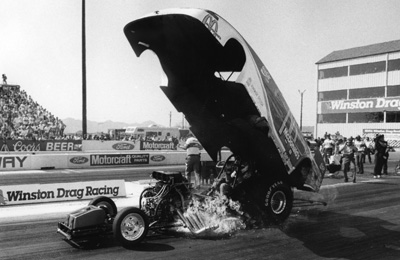 For whatever reason, the McDonald’s Funny Car struggled in early 1992, as crew chief Bernie Fedderly and Pedregon struggled through a slew of broken parts and explosions (like the Phoenix body lifter shown at right). Then came the Houston event, where Pedregon and Feddelry ran a stunning 5.10 to break Jim White’s two-year-old 5.13 national record and win the race. The team would win five more races that season -- including Indy -- and, of course, the world championship.
For whatever reason, the McDonald’s Funny Car struggled in early 1992, as crew chief Bernie Fedderly and Pedregon struggled through a slew of broken parts and explosions (like the Phoenix body lifter shown at right). Then came the Houston event, where Pedregon and Feddelry ran a stunning 5.10 to break Jim White’s two-year-old 5.13 national record and win the race. The team would win five more races that season -- including Indy -- and, of course, the world championship.
 McCulloch: “Their first couple of races were not good for the Funny Car -– they were blowing up a lot of stuff –- while I was doing pretty good with the dragster with Lee Beard tuning. We got to Houston and by Saturday night they had blown up everything in the trailer. Beard suggested to Minor that we take a motor out of the dragster and put it in their Funny Car and assist in any way he could as long as Bernie was OK with it. They went out and ran 5.10 and won the race.
McCulloch: “Their first couple of races were not good for the Funny Car -– they were blowing up a lot of stuff –- while I was doing pretty good with the dragster with Lee Beard tuning. We got to Houston and by Saturday night they had blown up everything in the trailer. Beard suggested to Minor that we take a motor out of the dragster and put it in their Funny Car and assist in any way he could as long as Bernie was OK with it. They went out and ran 5.10 and won the race.
“Bernie didn’t like the arrangement and Minor eventually ended up firing him. It turned out OK for Bernie because John Force hired and we all know how well that went for him.”
Top Fuel vs. Funny Car
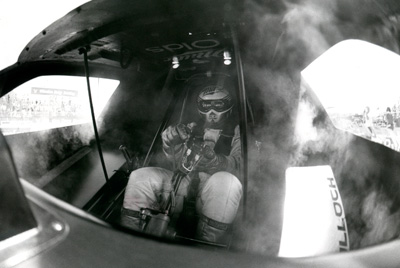 McCulloch got his start in Top Fuel in 1964 (see a collection of “the Ace’s” rides here) before switching to Funny Car in 1969. Although he ended up back in Top Fuel, he was always a Funny Car guy at heart.
McCulloch got his start in Top Fuel in 1964 (see a collection of “the Ace’s” rides here) before switching to Funny Car in 1969. Although he ended up back in Top Fuel, he was always a Funny Car guy at heart.
McCulloch: “I started out in Top Fuel and they called them ‘The Kings of the Sport’ – which they still do -– and while I was driving a Funny Car that always pissed me off.
“The dragster was so easy to drive. You’re out front and you can see. It’s quiet and you can finesse the thing down there. The Funny Car –- damn -– you can’t see anything, then you get the clutch dust, and it’s a handful; you’ve got to crank the [heck] out of it. You have to manhandle a Funny Car.”
Regrets, I’ve had a few
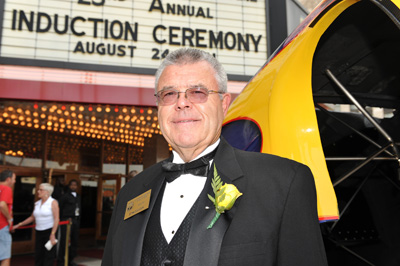 At 75, McCulloch is enjoying retired life, working on his golf game, driving his various hot rods, and traveling. He’s done just about everything a guy could do in drag racing -- including his 2000 induction into the International Drag Racing Hall of Fame and induction into the Motorsports Hall of Fame of America in 2011-- and remains a legend in the sport. Yet, like all of us, he has some regrets.
At 75, McCulloch is enjoying retired life, working on his golf game, driving his various hot rods, and traveling. He’s done just about everything a guy could do in drag racing -- including his 2000 induction into the International Drag Racing Hall of Fame and induction into the Motorsports Hall of Fame of America in 2011-- and remains a legend in the sport. Yet, like all of us, he has some regrets.
McCulloch: “It’s been a good life. If I had it to all over again, I wouldn’t change a lot. In all honestly, I maybe would try a little harder to be a better person. Someone made the statement once that I was better known as a scrapper than a racer. I don’t feel that way. Yeah, I didn’t take any [crap] from anyone, but I don’t want to be known for that.”
The fight photo
 Well, since he brought it up, I asked him to tell me again the story of this dramatic photo of him punching out fellow Funny Car driver “Flash Gordon" Mineo. The image has gone viral before in the drag racing world and even made into a t-shirt (none of it endorsed by McCulloch). Still, it’s a striking (no pun intended) image.
Well, since he brought it up, I asked him to tell me again the story of this dramatic photo of him punching out fellow Funny Car driver “Flash Gordon" Mineo. The image has gone viral before in the drag racing world and even made into a t-shirt (none of it endorsed by McCulloch). Still, it’s a striking (no pun intended) image.
McCulloch: “We were in Seattle at one of [Bill] Doner’s deals. We were all lined up on the racetrack and we had a tire that started leaking. Mineo’s ramp truck was right next to us, and he had an air tank sitting on it. One of my guys asked Ann [Mineo’s wife] if they could borrow it. She said sure, so they grabbed the tank and filled the tire.
“Apparently Mineo wasn’t aware that my guy had asked Ann and had permission. I wasn’t there for that, but as I’m walking back to the car, Mineo jumps in the middle of me about my guys, who the hell do they think they are, and all this. I don’t have any idea what he’s talking about. Then he makes some remark and I swung at him. I sorta missed, and just barely clipped his chin. I remember the look on his face – ‘If that’s all you have, old man, I’m going to kick your ass" – so here he comes at me. My second one, which is that shot, didn’t miss. It’s one of those things that shouldn’t have happened and someone got the picture and it’s gone ballistic."
Gen Next
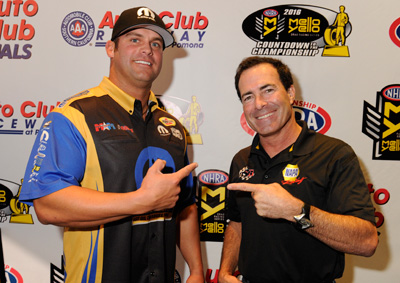 Even though he retired from the sport in 2010 -– after a successful post-driving run as a crew chief -– he’s still revered by many, including two-time world champ Matt Hagan and reigning champ Ron Capps, the latter of whom benefited from “the Ace’s” tutelage as a crew chief.
Even though he retired from the sport in 2010 -– after a successful post-driving run as a crew chief -– he’s still revered by many, including two-time world champ Matt Hagan and reigning champ Ron Capps, the latter of whom benefited from “the Ace’s” tutelage as a crew chief.
McCulloch: “The first time I ever talked to Matt Hagan, he didn’t even know who I was. Now he calls me periodically to talk about things. ‘Ace, you’re really the only guy I can talk to about this,’ and I’m always, ‘Sure, throw it out there, buddy. What do you need?’ It makes me feel good that the younger guys still look up to me, whether it’s about racing or a personal thing in their life.
“I love Ron, and I’m so happy he got his championship. I’m just bummed I couldn’t be the guy who helped him get it."
Indy or championship?
Again, I was reluctant to bring it up first because I know it’s probably a bit of sore subject, but for all his NHRA wins (22, including six at Indy), he never won an NHRA world championship. So I asked him, “Would you trade all of your Indy wins for one championship?”
McCulloch: “Not a chance. I might trade one, but I certainly would trade two of them. They mean too much to me.”
Thanks, "Ace." You mean a lot to all of us, too.
Phil Burgess can reached at pburgess@nhra.com



